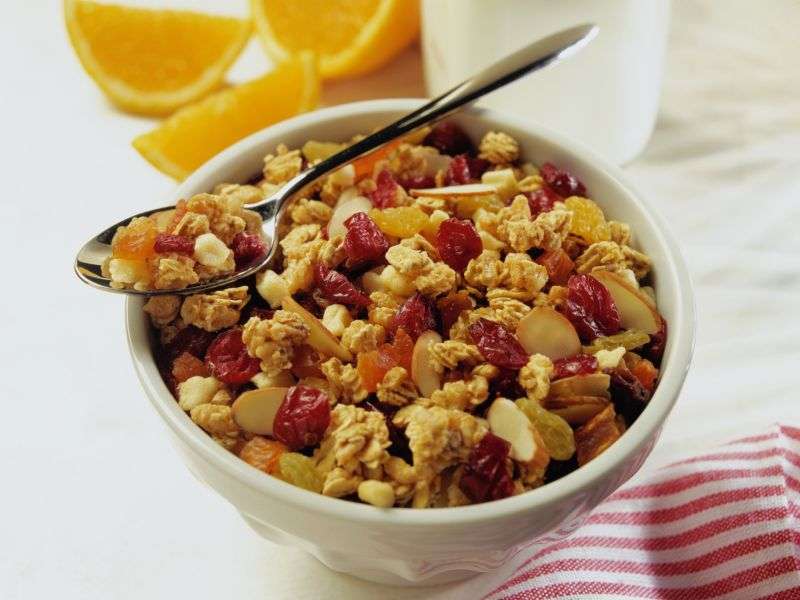Could your breakfast cloud your judgment?

Will that be eggs or cereal? The decisions people make might be partly based on what they had for breakfast that morning, a preliminary study suggests.
In a small experiment, researchers said that people's decision-making was often influenced by the amount of carbohydrates and protein contained in their breakfast.
Specifically, the study participants were more likely to reject an unfair financial offer if they'd filled up on carbs that morning. But if they'd eaten a lower-carb, higher-protein breakfast, they were more apt to take the money instead of having nothing.
So should you have a bagel, or steak and eggs before a big negotiation? The study can't answer that, experts said, because the research only found an association and couldn't prove that a high-carb breakfast caused one to be more wary of unfair financial offers.
It's also unclear why carbs or protein might influence some people's decisions.
But the study did point to a potential explanation, according to researcher Soyoung Park, of the University of Luebeck, in Germany.
After the high-carb breakfast, she explained, people tended to have lower levels of an amino acid called tyrosine. Tyrosine is important in producing brain chemicals like dopamine—which is part of the brain's "reward system."
And changes in tyrosine correlated with changes in people's decision-making, Park said.
Researchers who reviewed the study called it "interesting." But they said it's unclear what significance the findings might have.
"I doubt we can draw any conclusion on how to best manage our social interactions with food," said Dr. Luca Giliberto, a neurologist at Northwell Health Neuroscience Institute, in Manhasset, N.Y.
The findings, he said, do align with what's known about dopamine.
A lower-carb/protein-rich meal might allow for higher levels of tyrosine—possibly "reinforcing the (brain's) reward pathway," Giliberto noted.
That, in turn, might make a person more accepting of an "unfair decision," he added.
But the study leaves open many questions, Giliberto said: For one, it's not clear what people's usual diets were—which would influence their short-term response to a high- or lower-carb meal.
Simon Young is professor emeritus of psychiatry at McGill University in Montreal. He has studied the effects of diet on the brain and behavior, and he also said the new findings have to be taken with a grain of salt.
Young pointed to a number of limitations: The study tested only a small group of men; it used one lab-based measure of behavior—known as the "Ultimatum Game"; and the meals were not as tightly controlled as they could be.
The two breakfasts, Young noted, differed in fat, too. "So are we looking at an effect of carbohydrates, fat or protein?" he said.
Young also said the behavior changes can't be definitely pinned on tyrosine.
"This is an interesting study, but it's very preliminary," Young said. "There need to be larger, better-designed studies, with a broader range of measures."
The study, published June 12 in the Proceedings of the National Academy of Sciences, had two phases.
In the first, Park's team had 87 college students play an online version of the Ultimatum Game. The game gives players the opportunity to either accept or reject a clearly unfair financial offer from an opponent.
The catch is, if the offer is rejected, no one gets any money. So when a player makes that choice, it's seen as a form of "social punishment" for the opponent.
After playing the game, the students told the researchers what they'd eaten that morning. It turned out that 53 percent of people who'd eaten a high-carb breakfast rejected unfair offers; that compared with only one-quarter of students who'd eaten a lower-carb breakfast.
The second phase included 24 men who came to the lab for a controlled breakfast before playing the Ultimatum Game. They also had blood samples drawn over several hours.
On one day, the breakfast was 80 percent carbs, 10 percent protein: Bread with jam and cream cheese; milk and apple juice; and an apple and banana. On another day, the breakfast was 50 percent carbs and 25 percent protein: There was bread and jam again, but also ham, yogurt, milk and a bigger slab of cream cheese.
Again, the results were similar. The men were more likely to reject unfair offers after the high-carb breakfast.
The test included only men, Park said, because there are gender differences in metabolism that might have muddied the results.
But that, Giliberto said, only highlights the "complexity of the matter."
Even in this all-male group, he noted, people varied in their responses. Some still accepted unfair offers after having a high-carb breakfast, for instance.
It would be interesting, Giliberto said, to figure out why some people were influenced by the breakfast switch, and others were not.
To Park, the message is that the foods we eat may affect not only our physical health, but our "social decisions," too. She sounded a cautionary note about diets that shun any nutrient, like low-carb diets.
"I think it's really important to have a well-balanced diet, and not get stuck on any one nutrient," Park said.
More information: Sabrina Strang et al. Impact of nutrition on social decision making, Proceedings of the National Academy of Sciences (2017). DOI: 10.1073/pnas.1620245114
Copyright © 2017 HealthDay. All rights reserved.




















